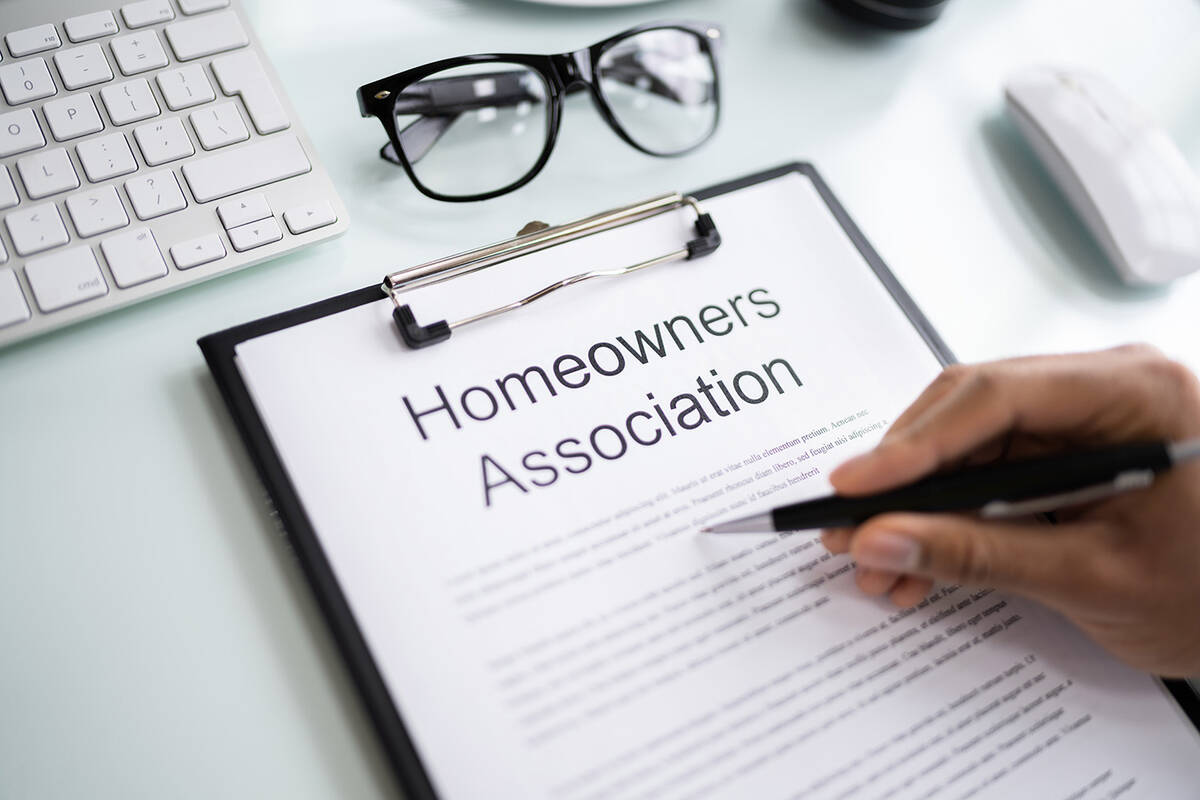Best to wait for written approval before starting project
Q: I want to say I thoroughly enjoy reading your question-and-answer section in the Las Vegas Review-Journal every Sunday. As a real estate agent, it helps with my own questions I have had with different homeowners associations.
Back in January 2022, we submitted an Architectural Review Committee application to our subdivision HOA to add concrete steps leading to the front door and side concrete walkway on the right side of the front yard leading from the sidewalk to our side yard gate. They wanted a specific start and stop with the work, so my husband resubmitted with the dates. Meanwhile, before we got the final approval, the concrete company was able to fit us in for the work, and the work was done.
I, of all people, understand yes, we made a mistake by doing the landscape work before the final approval. However, once we received a violation letter from the HOA, we received this from the board/HOA:
1. All exterior projects require an ARC application to be submitted to the ARC and/or board of directors prior to any work beginning.
2. The cement walkway project is not harmonious with any surrounding structures and is detrimental to the appearance of the surrounding area of the property as a whole.
However, a week later we received a letter from the HOA approving the steps leading to the front door but were told to remove the walkway leading to the side yard. Again the HOA stated: “The side walkway is not harmonious with the rest of the community.”
I understand if they were to deny everything and told us to remove all work done because we didn’t have the prior approval, but that’s not what they said as they were telling us we could keep the front steps.
Over the next four months we kept asking what was meant by “not harmonious?” And what changes could we do to make it more harmonious? The color, the materials: What would you like to see? The board’s opinion of what was “harmonious.” was in direct conflict with 10 of our neighbors, who told us “looks great, your yard looks much better and absolutely fits in with the rest of the street.”
Our covenants, conditions and restrictions do not prohibit the walkway. The CC&Rs do suggest concrete is appropriate for steps and walkways in our front yards. Because the board had not responded to our requests for what changes would be acceptable, we hired an attorney to see if they would respond to him. The HOA’s attorney did respond to our attorney, and after their discussions, we finally received from the HOA attorney an email that stated what materials would be acceptable to the board. The board wanted the walkway cement to be removed between the front of our home to the existing sidewalk, to be replaced with cement pavers. We then resubmitted a new ARC application showing the changes as requested by the board.
Another month went by with no communication from the board as to their acceptance or rejection of our new application. Finally, my husband met (for the first time) the president of our HOA at a mutual friend’s December Christmas party. (Almost one year since our infraction in January 2022)
The president suggested the entire board meet at our house after the holidays and resolve the issue. In late January 2023, the president said only he would be available, and we met in our front yard. He said the board, now, doesn’t want pavers all the way to the sidewalk at the street, saying: “Nobody else in the neighborhood has it that way.” At that point we all walked down our street where we pointed out five examples of pavers, which were laid from the house to the sidewalk. And that was five examples within four homes from our home on the same side of the street!
We then asked the president: “How far from the house toward the sidewalk would the board like the pavers?” The president said he would ask the board and would get back to us.
Still at the house, we asked about the board’s decision to remove any fines that had been levied on us, ($3,200 at this point) at such time as “whatever” changes the board wanted would be completed to their satisfaction. The president said: “Let me put it this way, we have not required anybody to pay fines.”
Since we never heard from the president or the board again, and this nightmare had been going on for a year, we removed the concrete walkway, returning our front yard back to its original condition, that of desert colored landscape stones.
In March 2023 we received a “final bill” of $3,147 in fines, which had never been removed. I went to the property management office and spoke to our property manager, and she stated that for the board to waive the fine, I could write a letter to request its removal. She also stated: “Two out of three board members were leaning toward waiving the fine.” After the executive session, we received a letter reducing the fine to $2,047, which included administrative fees. I again called and spoke with the property manager, and she said she was sorry. The board members discussed our request, but the board felt since we hired an attorney and they had to get their attorney involved, they felt we should pay $2,000 of the attorney bill.
Meanwhile, the president of our HOA board sold his home, and he has resigned from the board. Now, we have two of the original board members. I again requested a waiver by sending another letter to same two board members and again was denied. Now, the denial from the HOA board states: “The board has decided not to waive the fines since they have already waived $1,100. Their decision was based on the following; ARC approval from both association should have been obtained prior to any construction beginning, the association incurred legal costs due to this issue, which could have been avoided if the ARC had been submitted prior to construction, and they were also forced to seek legal advice after a revised ARC was received with new information, and an HOA has a right to require “unauthorized projects’ be returned to their previous state.”
Since receiving this second denial, I have arranged to pay the fine in payment plan with the HOA management company.
I think this whole situation didn’t need to get this far, but our request for what is “not harmonious” was not answered in timely manner. To get any response, we had to get an attorney involved.
I understand yes, we should have had an approval first, but am I wrong to assume it was incorrect for the HOA board to OK one part but deny our walkway because it was “unharmonious,” according to them?
I am considering talking to the ombudsman’s office and fill out the complaint form but not sure if I am totally incorrect and should just drop this.
I would appreciate your opinion in this matter and sorry if I rambled. Trying to condense all that has happened in one-and-half year is difficult.
A: As a real estate agent, under Nevada Revised Statutes 645 and Nevada Administrative Code 645, you are aware of the many laws that regulate real estate transactions. Failing to follow those regulations can result in penalties including the loss of your license. This column has stressed the importance of homeowners following their architectural guidelines and to absolutely avoid beginning your architectural project unless you receive written approval from your board. When you don’t receive a formal written approval, unwanted consequences occur.
You do have the right to file a complaint with the ombudsman or ask for an intervention, but you may not get very far because you did begin work prior to approval. You have asked for a reduction in fines and did receive at least one. There should be an itemized statement listing what was the total amount of fines separate for the cost of the attorney fees. The ombudsman’s office can review your enforcement guidelines to determine if your association followed their procedures. You could also challenge the cost for the attorney that was assessed against your account. Review your governing documents before contacting the ombudsman.
Barbara Holland, CPM is an author, educator, expert witness on real estate issues pertaining to management and brokerage. Questions may be sent to holland744o@gmail.com.













